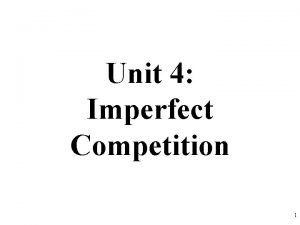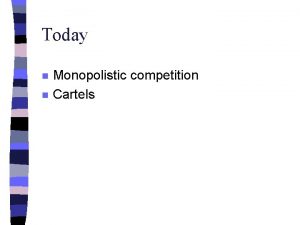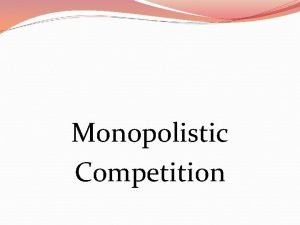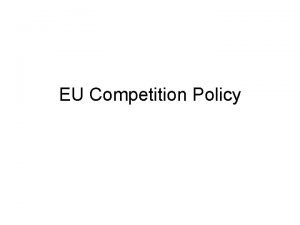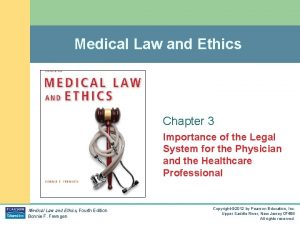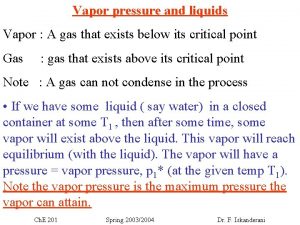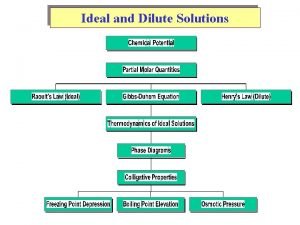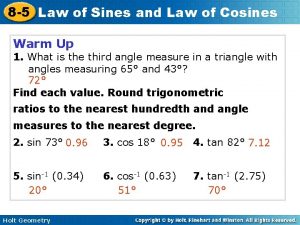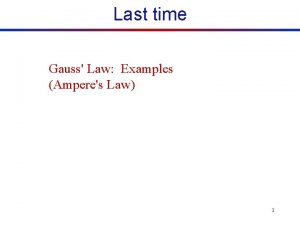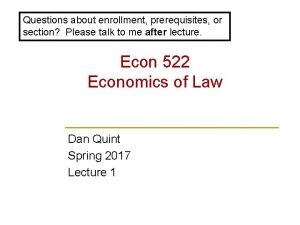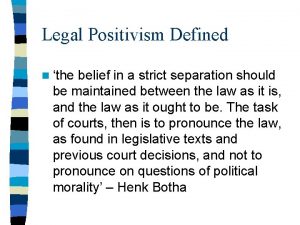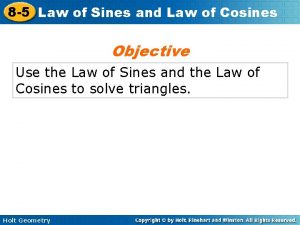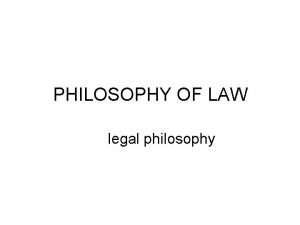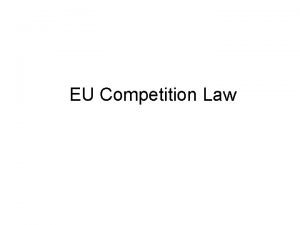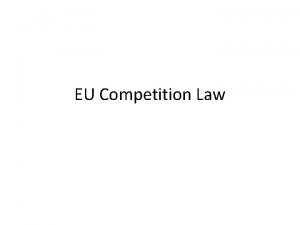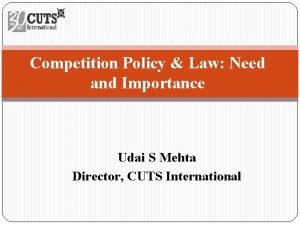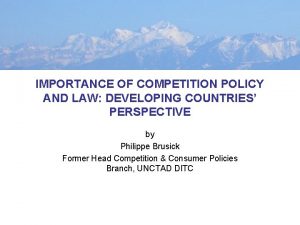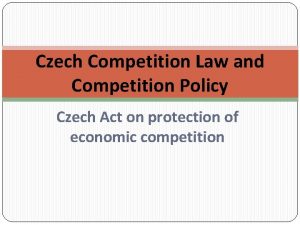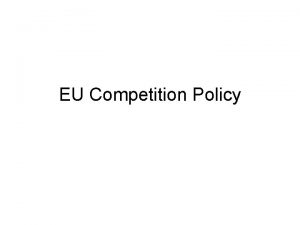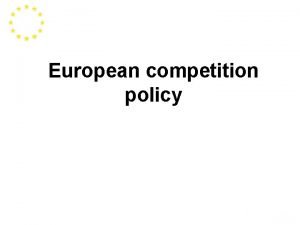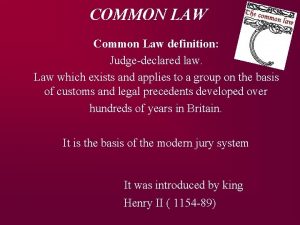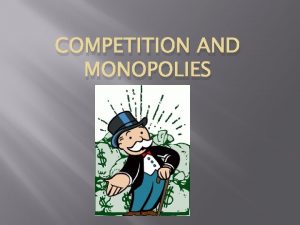Importance of Competition Law and Policy Competition Policy





































- Slides: 37

Importance of Competition Law and Policy • Competition Policy encompasses governmental measures that affect the behaviour of enterprises and the structure of industry. • At the heart of competition policy lies the competition law. • Economic theory demonstrates that welfare is greatest when there is ‘perfect competition’. i. e allocative and productive efficiency.

• Developing countries have witnessed important economic changes which have made competition policy more important These include: 1. Privatisation 2. Liberalisation of trade and capital controls. 3. Deregulation • Apart from stimulating efficiency and preventing unfair competition, competition policy protect interest of consumers and businesses are consumers too i. e they buy intermediate goods.

• The survey reveals that 78% of the sample agree that existing laws are not sufficient to check anticompetitive practices prevalent in Mauritius. • Moreover, above 85 % of the private and public sector respectively and above 70 % of consumers are in favour of introducing a more comprehensive law on anticompetitive behaviour. • The Competition Act (2003) has already been drafted but has not yet come into force to date.

Objectives of the Law • The Competition Act establishes a legal framework for the control of restrictive business practices with a view to enhancing competition in Mauritius through measures designed to promote efficiency, adaptability and competitiveness in the economy for the end purpose of widening the range of customer choice in obtaining goods and services at a fairer and more competitive prices. • According to the investigation carried out, about 79% of the sample think that the Competition Act should focus on economic efficiency and consumer welfare and only 21% believe that the law should also consider other socio-economic issues as well.

• Any competition policy need to be consistent with national development objectives and priorities. Some countries like South Africa have made the connection with development objectives explicit. • Some people disagree with the approach of integrating non-competition concerns in the law. Competition law is not the best way to address the advancement of historically disadvantaged people or promotion of employment. • A focus on consumer welfare and economic efficiency, while taking regards of other policies might be preferable.

Should The Law Apply to All? • Exemptions to the provisions of the law can be: sector specific, enterprise specific and practice or agreement specific. Exemptions form part of the expression of the objectives of competition law. There is no consensus on the desirability of exemptions. • 58% of the sample agree that the law should cover all enterprises and persons, that is, no company is to be exempted from the law.

Should the law cover all types of enterprises/activities?

• In case, there are exemptions, SMEs are the first to be given preference according to 52% of the sample, followed by Public Utilities Companies (22%) , State-Owned Enterprises (19%) and only 3% believe that Import/Export enterprises are to be exempted.

Who should be exempted from the law?

Agreements Exempted under the law: • Agreements relating to Export of goods and Services. • Agreements relating to remuneration and employment terms • Agreements relating to the use of licence or rights acquired by virtue of law relating to copyright, design rights, patent, trade marks. • Agreement approved under an international agreement to which Mauritius is a party. • Agreement authorised by an enactment or any scheme or instrument made under an enactment.

• Moreover, certain goods and services are excluded from provisions of the law relating to monopoly situations . These include aviation and harbour services, broad casting services, electricity services, financial services, Freeport services, information and communication technologies , postal services other than courier, goods and services supplied by state enterprises and water other than for retail trade. • In addition, agreements between members of a professional or trade association are excluded from the provisions relating to collusive agreements.

• As regards to anticompetitive agreements, if the Minister is satisfied that such an agreement would be beneficial to consumers, it would be exempted from the provisions of the law. • Concerning bid- rigging exception is made to agreements where parties are interconnected bodies corporate as well cases where the agreement whose terms are made known to the person making the invitation for bids or tenders at or before the time the bid or tender is made by a party to the agreement.

• A competition law and policy serves the public interest and should as such not be too rigid and versatile enough to deal with varying public needs. But too many exemptions possibilities would create opportunities for lobbying of different interest groups. This could lead to inconsistent application of the law and undermine long term objectives of competitiveness, growth and job creation among others.

COMPETITION AUTHORITIES: Powers and Capabilties Competition Act Office of Fair Trading Acting as Competition Authority Competition Tribunal Competition Advisory Council

• The survey also reveals that 48. 6% of the sample prefer an autonomous competition authority whereas 46. 7% prefer a competition authority that is an agency under the relevant Ministry. • A breakdown into different groups indicate diverging views. In fact, 68% of the private firms and 74% of government institutions interviewed prefer an autonomous competition authority. On the other hand, about 60% of consumers prefer a competition authority that falls under the Ministry as opposed to 38% who prefer an autonomous CA.

CA: Autonomous or Under Ministry?

• The Competition Act stipulates that the Director of the CA will be responsible for the control, operation and management of the day to day business of the office. Moreover, the CA will appoint its public officers who will be under the control of the Director. • But the Director need to report to the Minister on its activities and the Minister may give the Director such instructions as it deems necessary if he considers that the matter is against public interest.

POWER OF THE CA • For the CA to operate efficiently, it must be allocated the necessary and right powers to enforce the law. These can be seperated into ‘investigative’ and ‘adjudicative’ powers. • The practice of whether or not to separate the powers varies across countries. South Africa the Competition Commission plays an investigative role whereas adjudication is left to the Tribunal. In India, Tanzania and Zambia, the CA have judicial role i. e their judgements have legal force. In Kenya, this power lies with the Minister.

• In Mauritius, the duties of the Director include the investigation of any allegation or suspicion of restrictive business practices, gather, process and evaluate information which give rise to such suspicion and take measures to prevent or terminate any restrictive business practices including issuing directives and proposals for remedial action. This includes the acceptance an undertaking from the person he considers appropriate to prevent or terminate such restrictive business practice.

• The Competition Tribunal has the power to give such directions it deems fit for the purpose of preventing or terminating an anticompetitive practice. • The survey shows that 34 % believe that it should have both investigative and adjudicative powers against 64% who believe that the Competition Authority should be empowered to carry out investigations only leaving the power to judge to either a separate authority(43%) or to courts (21%).

• Bundling of powers is increasingly being criticised by lawyers and businessmen. Seperation of powers helps to establish trust and fairness on law enforcement. But to go to courts everyday is time and resource intensive and diminish the effectiveness of the CA. Further the judicial system in developing countries are overloaded and undermanned.

Should the CA deal with unfair trade practices/consumer protection issues as well? • Unfair trade practices are mainly misleading practices which affect consumers directly. • There is certainly a link between competition law and consumer protection issues but the latter seeks to protect consumers indirectly through fostering competitive markets rather than through more specific remedies under consumer protection laws. • Some provisions under the competition law such as prevention of tied sales, resale price maintenance and excessive pricing can be seen as direct remedy for consumers abuses directly.

• Many countries such as Australia, Bulgaria, Canada, Colombia, Russia, UK, US and Zambia cover both competition and consumer protection areas. In India, the new law has dropped consumer protection issues as they are already covered under the Consumer Protection Act. • According to the survey, The majority of consumers (75%) believe that the Competition Authority should also deal with unfair trade practices . 60% of the private sector and Govt think along the same line respectively.

Interface with Sectoral regulators • Many public monopolies have been converted into private monopolies with the wave of privatisation. Sectoral regulators have been set to enforce targets for price, quality, investment, health and environmental standards etc. • However, very often the close relationship between the industry and the regulator can undermine the ability of the latter to make objective judgements about the industry.

• The relationship between CA and sectoral regulators is subject to much discussion. Sometimes their responsibilties are not clearly delineated and they may act as rivals in case the CA starts investigating in the regulated sector. • There is no clear solution to the problem of conflicts between sectoral regulators and the CA. • One solution will be to spell out the responsibility of each body respectively requiring them to cooperate and share information. For instance the sectoral regulator could concentrate on setting prices and standards while the CA looks at the bigger structural picture. But the ideal balance will vary from case to case.

• In Mauritius, as per the Competition Act, it seems that such disputes might not arise as it is stated that the law will not apply to “any practice or agreement expressly required or authorized by an enactment or by some scheme or instrument made under an enactment”. Besides, the second schedule of the Act excludes certain goods and services where sectoral regulators exist. • The survey shows that about 70%of the sample concur with the view that sectoral regulators are needed in certain sectors only with the CA either having power over them(43%) or coordinating with them (27%). The remaining 30% prefer many sectoral regulators with the CA controlling or coordinating with them.

A different analysis of the response shows: ( % ) CA having power over regulators CA coordinating with regulators Consumers Private Govt 55. 2 63 81. 4 43 36. 9 18. 6

Should the law prescribe criminalisation? • Various types of sanctions are provided in different competition laws. Cease and desist orders, fines and penalties, demerger, division of entities are the main provisions. • Above 90% of the sample are of the opinion that there should be criminalization prescribed in case the law is violated including about 30% who specify that it should be in some cases only.

• The law in Mauritius any person engaging in bid-rigging (excluding exemption cases) is liable to a fine not exceeding Rs 500, 000 or to imprisonment not exceeding 5 years. • Furthermore, anyone who fails to comply without any reasonable excuse to the Act, cause offences such as obstruction of investigation or contempt issues liable to a fine not exceeding Rs 500, 000 or to imprisonment not exceeding 2 years or both.

Should there be exemptions from criminalisation? • 67% share the view that some should be exempted on public interest grounds, that is when it comes to objectives such as technological advancement, protection of SMEs or socially disadvantaged groups and employment. • However a breakdown shows that 51% of the private sector and 62% of government bodies want equal treatment to all, that is no exemption as regards to criminalization penalty if the law is violated.

Should there be exemption to criminalisation based on public interest grounds?

• Laws tend to have two approaches to restrictive business practices: “per se” approach or “rule of reason” approach. • Section 16 of the law states that the CA and the tribunal should pay attention to the - desirability of maintaining and encouraging competition and the benefits to be gained in respect of price, quantity, variety and quality of goods and services - positive effects of absence or preventing competition in terms of safety of goods and services , efficiency in production supply and distribution as well as development and use of new and improved goods and services and means of production and distribution -sharing of benefits between consumers and business sector has to be considered.

• As per the survey, 74 % agree that the law should have provisions for the right to private action. • A person can make a complaint about restrictive business practices to the Office of Fair Trading which will investigate the allegation or suspicion. • Any person aggrieved by the Director’s decision can appeal to the Competition tribunal. • Moreover, any party dissatisfied with the determination of the Competition tribunal may appeal to the Supreme Court.


• The survey also showed that 68% of the sample agree that the CA should involve different stakeholder groups in its functioning including advocacy people. • In order to create a competition culture, awareness of competition issues and how they affect various groups needs to be creatted among businesses, consumers, policy-makers and the media. • The Competition Act establishes a Competition Advisory Council whose objectives include: -advising the Minister on matters relating to restrictive business practices

-promote activities to raise awareness of the business community and consumers on competition and related matters - maintain communication with the business community and consumer associations - and promote research in emerging trends in the field of fair competition and best business practices. • Its members would include a Chairperson, a representative of the Ministry of Commerce , the Director of the Office of fair Trading, a representative of the attorney-general’s office, a representative of MCCI, a representative of JEC, 2 representatives of consumer organizations,

and not more than 5 persons who are knowledgeable in consumer affairs, business, finance, economics or management but would be appointed by the Minister
 Newton's first law and second law and third law
Newton's first law and second law and third law Si unit of newton's first law
Si unit of newton's first law Lump sum subsidy
Lump sum subsidy Perfect competition vs monopolistic competition
Perfect competition vs monopolistic competition Market structures venn diagram
Market structures venn diagram Competition refers to
Competition refers to V=k/p
V=k/p Constant in avogadro's law
Constant in avogadro's law Importance of policy and procedures
Importance of policy and procedures What is competition policy
What is competition policy Sanction behind directive principles
Sanction behind directive principles The cellophane fallacy
The cellophane fallacy Chapter 3 healthcare laws and ethics
Chapter 3 healthcare laws and ethics Raoult's law and dalton's law
Raoult's law and dalton's law Difference between civil law and criminal law
Difference between civil law and criminal law 4-7 the law of sines and the law of cosines
4-7 the law of sines and the law of cosines Toluene distillation under vacuum temperature
Toluene distillation under vacuum temperature Criminal law plaintiff
Criminal law plaintiff Raoult's law and dalton's law
Raoult's law and dalton's law Azeotrope
Azeotrope What are statute laws
What are statute laws Common law australia
Common law australia 8-5 practice b law of sines and law of cosines
8-5 practice b law of sines and law of cosines Raoult's law and dalton's law
Raoult's law and dalton's law Ampere gauss
Ampere gauss 8-6 the law of sines
8-6 the law of sines Law is order and good law is good order
Law is order and good law is good order Pactum commissorium meaning philippine law
Pactum commissorium meaning philippine law Common law and civil law
Common law and civil law Common law and civil law
Common law and civil law Tommaso febbrajo
Tommaso febbrajo What is the sine and cosine rule
What is the sine and cosine rule Positivism and natural law
Positivism and natural law 8-5 law of sines and law of cosines
8-5 law of sines and law of cosines Positive law vs natural law
Positive law vs natural law Positive law vs natural law
Positive law vs natural law Positive law vs natural law
Positive law vs natural law Mendel's law of dominance
Mendel's law of dominance


